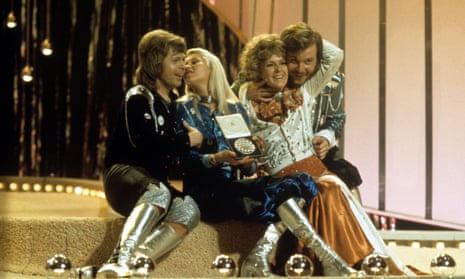In 1973, Abba were invited to submit a song as Sweden’s entry to the Eurovision song contest. We had a perfect song: it was called Hasta Mañana. It was a ballad, it was catchy, it sounded like the kind of thing that did well in the Eurovision song contest. So we didn’t enter it. We chose Waterloo instead, which sounded like nothing we had ever heard at Eurovision before. That was the point: I thought we might come sixth or seventh, but people who saw the show – people outside Sweden, who had never heard of Abba – would remember us. It was a huge, calculated risk, and it paid off in a way we could never have imagined.
If I was a young songwriter today, I’m not sure if I would take a risk like that, because the world of songwriting has changed. As a result of this, I commissioned a report in collaboration with MIDiA Research to provide an evidence-based overview of how the songwriter fits into today’s music business culturally, creatively and commercially. I had just been appointed president of CISAC, an international not-for-profit organisation that promotes the rights and protects the interests of creators worldwide. I didn’t want to point fingers or put blame on anyone, I wanted something constructive, that the music industry and music fans could both read and hopefully get on board with.
Rebalancing the Song Economy shows that we live in an era where the song fuels everything: whereas albums used to be the go-to consumption format, the dominant currency in streaming is individual songs; data shows that when people use a streaming platform such as Spotify, they search more for songs than they do for artists. That means songwriters are more important than ever – but, if you are a songwriter, the system is dysfunctional.
Performance royalties from broadcast TV and radio are in long-term decline, because audiences have migrated from broadcast TV and radio to on-demand alternatives. Physical sales of music and sync revenue – where both artists and songwriters are rewarded – continue to fall, which means fewer mechanical royalties for songwriters. They have none of the other means of making money available to artists – no diversity of income: songwriters don’t tour, nor do they sell T-shirts and other merchandise. In essence all of their income comes from the song.
Streaming has changed everything, but songwriters are last in line for streaming royalties: the system works in such a way that for a million subscriber streams, an independent label artist could earn more than $3,000 (£2,175), whereas the songwriter could expect to earn between $1,200 (£870) and $1,400 (£1,015) and, even then, only if they are the sole songwriter on the track. If you co-wrote the song, that money is split between you and your fellow writers. On average, songwriters therefore earn between a third and a half of what artists do. If we live in a “song economy”, that’s unfair: the distribution of royalties needs to change to reflect that.
![Long-term songwriting partnerships such as that of [L-R] Robbie Williams and Guy Chambers could offer one solution to the trials facing songwriters.](https://i.guim.co.uk/img/media/e3aa0591f051d2583929dc6cbf8f4a5d94679683/61_463_2579_1546/master/2579.jpg?width=445&dpr=1&s=none)
This isn’t about becoming rich. It’s about new songwriters both being able to develop their craft and receive fair remuneration for their work. Before Abba, Benny Andersson and I had a kind of songwriting apprenticeship, nearly 10 years in Sweden where we wrote, apart and together, getting better at what we did. You can’t have that time – or the creative freedom you need to improve – without royalties. If you don’t earn enough to support yourself, you have to take on another job, which means you can’t concentrate on the thing you want to do.
There are other problems that continue to make the songwriter equation unbalanced. Streaming has led to a vast volume and faster turnover of music. It has shortened listeners’ attention spans and led to a weaponised form of songwriting. There are songwriting camps, where writers and artists are thrown together for a day and have to finish writing a song by the evening; a reliance on a small group of elite songwriters, organised into teams, to come up with machine-tooled hits, “optimised for streaming”.
It’s an industrialised process and creates a climate that discourages any kind of risk-taking or creativity, making it even harder for a writer to build on any initial success. Certainly, it’s a climate in which Benny and I wouldn’t have stood a chance – we only ever wrote 13 or 14 finished songs a year, we ruthlessly threw away anything that we thought was mediocre and worked and worked at the ideas we thought were good.
Streaming has led to a two-tier system of music. There are “lean-back” songs, tracks that just play in the background on playlists, functional music that you barely notice: there are whole lean-back playlists designed for studying or relaxing, populated with made-for-purpose filler. And there are “lean-forward” songs – tracks you actively look for and click on, tracks you want to listen to, the modern equivalent of going to a record shop and buying something, instead of hearing it on the radio and ignoring it. Why shouldn’t royalty payments differentiate between these two kinds of song? Songwriters should be paid higher royalties on “lean-forward” songs than on “lean-back” tracks. You could achieve this by measuring whether users have searched for or linked to a track or added it to their collection.
There are other potential solutions. Record labels could encourage a “songwriter in residence” model, where artists are paired with songwriters at the development stage, as a long-term partnership: the writers would effectively become part of the band, paid a regular salary. It’s a radical solution, and it would require imagination to match up the right personalities, but it’s not unprecedented – think about Robbie Williams and Guy Chambers in the late 90s and early noughties, an artist and a professional songwriter working together to create a career – and it could create really interesting music as a result.
There is another very important issue in the report: about changing the way money within the system is distributed to a “fan-centric” model. In order to ensure that all songwriters get paid fairly, I suggest that streaming services allocate their royalty payments based on the behaviour of individual listeners. The subscription should be divided by the number of songs the individual listener has played during a month. That gives each song a value. If the subscription is $9.99 and the listener has played 10 Arne Jansen Trio songs that month, each song has the value of $0.99, almost a dollar, and that’s the amount that will be paid to the trio. Under the current system [where artists receive their proportional share of all plays across the platform], you can be sure that Arne’s songs would get the value of point-zero-zero-something dollars. A fan-centric approach to royalties would be fairer and build on important starts made by Deezer and Soundcloud.
I am not, for a moment, about to suggest that we should turn back the clock, which you may have expected from an elderly pop star. What’s happened in the last decade has the potential to be incredibly positive for songwriters. A movement has started on both sides of the Atlantic, gaining momentum during the pandemic: 2021 promises to become the year of the song.










